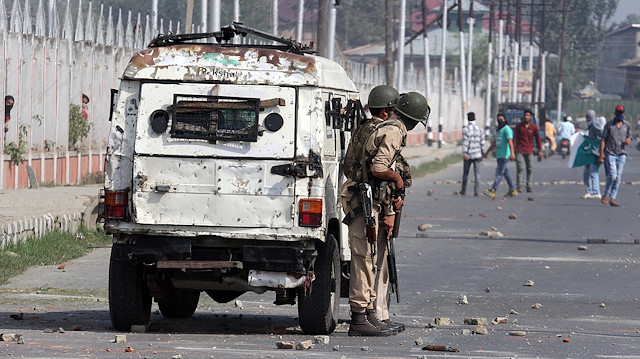
Local human rights group documents killings, cases of torture, rising rate of suicides among security personnel
A local human rights group has documented 69 killings in Kashmir since the revocation of the region’s special status on Aug. 5.
Challenging Indian government claims that no civilian death took place in Kashmir after August, a report compiled by Jammu and Kashmir Coalition of Civil Society (JKCCS) said that out of 69 killings 33 were civilians.
The dead also included 20 militants and 16 security forces personnel.
“In October alone, 17 civilians were killed," said the report.
The annual review of human rights situation released by the group in Srinagar, capital of Indian administered Kashmir on Tuesday has mentioned the killing of 80 civilians in 2019. The year also witnessed the killing of 159 militants, besides 129 Indian security personnel.
Out of dead 80 civilians, 12 were women.
“As many as 19 were killed by armed forces, 17 died in the exchange of shelling between Indian and Pakistani armed forces along the border, while 28 civilians were killed by unidentified gunmen,” said the report.
It also mentions the killing of eight children in various incidents of violence. “Children also faced illegal and unjust detention, ill-treatment, including torture, at the hands of armed forces during detention and fear of further reprisals," the report added.
The year 2019 also witnessed 87 incidents of gunfights between Indian armed forces and the militants.
The revocation of special provisions in August has also abolished various state-run watchdogs like Jammu and Kashmir State Information Commission, the Jammu and Kashmir State Human Rights Commission, and the Consumer Commission.
The report also highlighted curbs on media, with several incidents of beating and thrashing of journalists. “Besides physical assaults, journalists in 2019 also faced reprisals for filing stories on contentious issues.”
Further, the government has not allowed prayers in the historic Jamia Masjid mosque in Srinagar for 24 weeks.
“A centuries-old tradition of Khoja Digar, a special afternoon prayer held at Naqshband Sahab shrine in old Srinagar city, was also disallowed first time this year on Nov. 2,” the report said.
There were 54 instances of internet blockades recorded in the year 2019 before Aug. 5. Since August, the internet clampdown has completed 149 days, which has severely hampered businesses and education in the region.
The report also mentioned cases of sexualized torture and gendered violence.
“Mohammad Yasin Bhat and 11 other men from Parigam area in Pulwama district in south Kashmir were detained during the cordon and search operation. They were stripped naked and kept in a queue on the main road. All of them were electrocuted in their genitals. When the physical torture ended, they were made to lie face down on top of each other, in a pile,” the report claimed.
The report also points out that the Kashmiris living in India -- be it, students, businessmen or professionals, continue to remain prone to harassment from state forces, right-wing student groups and from the general public.
“In 2019, at least 43 incidents of attacks on Kashmiris across India were reported throughout India, with 42 of them alone in the first quarter of 2019, in the aftermath of the Pulwama bomb blast in which around 48 Indian soldiers were killed,” the report states.
The report also documented, the trend of suicides and fratricides among Indian armed forces stationed in Kashmir. As many as 19 armed forces have reportedly committed suicide while three personnel were killed in a fratricidal incident in Udhampur district.
“The rising rate of suicides among Indian armed forces in Jammu and Kashmir --battling an insurgency and people’s movement, where they are pitted against the civilian population and armed insurgents, is one of the most ignored aspects of the impact of the continued militarization in the region, “the report concluded.
Hello, the comments you share on our site are a valuable resource for other users. Please respect other users and different opinions. Do not use rude, offensive, derogatory, or discriminatory language.
The floor is all yours.








